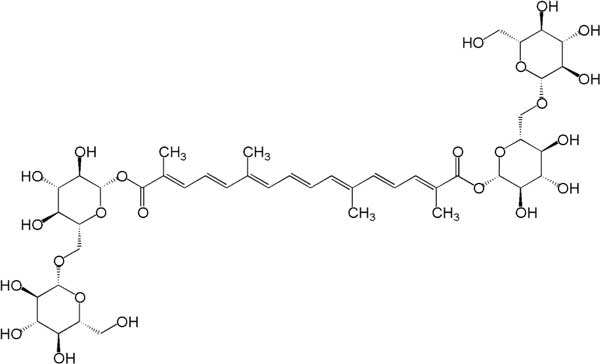Crocin and crocetin are metabolites present in saffron that give it medicinal properties. Metabolites are compounds that serve as intermediates or end products in cellular metabolism, usually referring to small molecules involved in cellular building and energy production.
Saffron has been used as a food seasoning for years. In addition to its nutritional value, this spice holds a special place in traditional medicine. It is used as a pain reliever, such as for stomach and kidney pain, as well as a relaxant and stress reducer. In our article on the benefits of saffron, we have extensively discussed the conditions that saffron can improve. This article takes a more scientific look at the functioning of saffron.
Metabolites of Saffron
The saffron used is the stigma of the saffron plant. This part contains important metabolites such as crocin, crocetin, safranal, and picrocrocin. Crocin is responsible for the red colour, picrocrocin contributes to the bitter taste, and safranal is responsible for the aroma of saffron.
Safranal (soluble in fat) and crocetin (a precursor to crocin) are bitter, but the most important factor contributing to the bitterness of saffron is picrocrocin.
As mentioned, saffron possesses medicinal properties and is recognized as a medicinal plant. The most important medicinal component of this plant is a substance called crocin.
Researchers have conducted scientific investigations into the effects of crocin on various diseases, and we will now mention some of them.

Crocin in Neurological Disorders
A study investigating the anxiolytic effects of crocin compared to diazepam (an effective anti-anxiety medication) in laboratory conditions showed that crocin, at specific doses, reduces anxiety similar to diazepam. It was ultimately determined that saffron is effective in improving sleep and reducing anxiety, but these effects are dose-dependent.
After multiple studies on individuals with mild depression, it was found that the consumption of a specific dose of saffron could have a positive impact on improving depression. The mechanism of saffron’s effect in reducing anxiety is likely through the influence of crocin and safranal on dopamine (the happiness hormone), norepinephrine (the stress hormone), and serotonin (the happiness hormone).
More precisely, crocin likely affects the dopaminergic system (dopamine transport pathways), while safranal affects the serotonergic system (serotonin transport pathways).
Crocin and Eye Diseases
Experiments and studies have shown that saffron may be effective in treating certain eye diseases such as age-related macular degeneration (AMD). These effects have been attributed to crocin and crocetin, which likely prevent apoptosis (programmed cell death) and thus protect the light-sensitive receptors from light-induced damage. Additionally, crocin increases retinal blood flow and improves its function.
On the other hand, crocetin increases the release of oxygen into fluids such as plasma. Therefore, saffron and its constituents, particularly crocin and crocetin, can act as protectors of eye function.
These effects can be attributed to their antioxidant activity, inhibition of apoptosis, and anti-inflammatory properties.
Crocin and Memory
Japanese researchers have claimed that crocin and crocetin are effective in enhancing learning and memory skills.
In general, based on the results of studies on the impact of saffron on memory, it appears that saffron and its constituents, especially crocin, enhance memory and reduce the detrimental effects of external factors on memory.
Crocin and Antioxidant Function
The most important role of crocin is its antioxidant function. Crocin can influence oxidative stress by increasing the expression of genes involved in antioxidant processes and antioxidant enzymes, neutralizing the effects of numerous free radicals.
Crocin and crocetin can also combat neuroinflammation associated with diseases such as Alzheimer’s and Parkinson’s.
In conclusion,
the high value of this flavorful and aromatic plant is not without reason. Nowadays, efforts are being made to utilize the active compounds and secondary metabolites of saffron in the treatment of various diseases, and it has gained a significant position as a medicine in modern medicine.
F&Q
What are the health benefits of saffron?
Saffron has several health benefits. It has been found to have antioxidant properties, reduce anxiety and depression, improve sleep quality, enhance memory and cognitive function, and may have potential in the treatment of eye diseases such as age-related macular degeneration (AMD). Additionally, saffron has anti-inflammatory properties and can potentially combat neuroinflammation associated with Alzheimer’s and Parkinson’s.
How does saffron reduce anxiety and depression?
Saffron contains compounds such as crocin and safranal, believed to influence neurotransmitters in the brain. These compounds may affect dopamine, norepinephrine, and serotonin levels, which are involved in regulating mood and emotions. By modulating these neurotransmitters, saffron can help reduce anxiety and alleviate symptoms of depression.
Can saffron improve memory and cognitive function?
Yes, saffron has been shown to affect memory and cognitive function positively. The active compounds in saffron, particularly crocin and crocetin, have been found to enhance learning abilities and improve memory retention. Saffron’s antioxidant properties and ability to reduce neuroinflammation may also contribute to its beneficial effects on cognitive function.
How does saffron protect eye health?
Saffron contains crocin and crocetin, which have been found to have protective effects on the eyes. These compounds help prevent apoptosis (programmed cell death) and protect the light-sensitive receptors in the eyes from damage caused by exposure to light. Saffron also improves retinal blood flow and can enhance overall eye function.
What is the role of saffron as an antioxidant?
Saffron, particularly its active compound crocin, exhibits strong antioxidant properties. It can increase the expression of genes involved in antioxidant processes and stimulate the production of antioxidant enzymes. This helps neutralize free radicals and reduces oxidative stress associated with various chronic diseases and aging processes. By acting as an antioxidant, saffron protects cells and tissues from damage caused by oxidative stress.


![What is crocin in saffron? [3 important benefits]](https://www.saffronuses.com/wp-content/uploads/2023/08/Add-a-heading-750x430.webp)